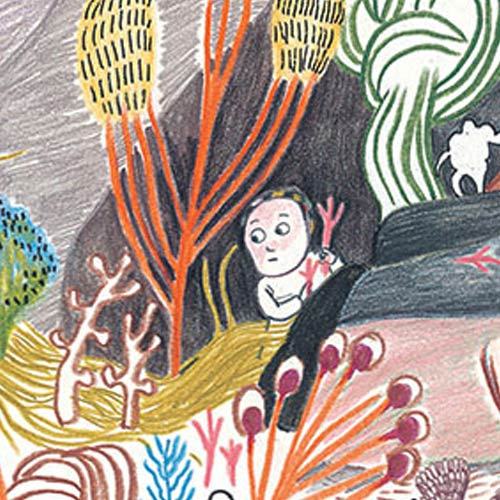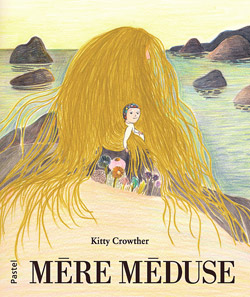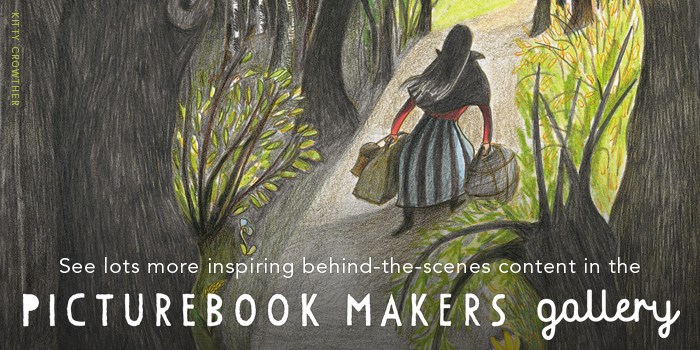< Back to posts
Kitty Crowther
Belgium

Kitty Crowther, who is half English and half Swedish, was born in Brussels and lives in Wallonia in Belgium. She's written and/or illustrated about forty books which have been translated into twenty languages. In 2010, Kitty won the world's most prestigious prize for children's literature: the Astrid Lindgren Memorial Award.
In this post, Kitty talks about the creation of her latest picturebook, ‘Mère Méduse’ (Mother Medusa), and she shares some enchanting sketches and illustrations. This striking picturebook about the maternal bond is published in French by Pastel—l'école des loisirs.
Kitty: It’s the fiftieth anniversary of l’école des loisirs in 2015. I used to read those books as a child and loved them over and over. I've now been working with Pastel—l'école des loisirs for twenty years. My latest book with them will be released in November 2014. It's called ‘Mère Méduse’. To translate the title into English, I would say ‘Mother Medusa’ and not ‘Mother Jellyfish’. Even though medusa and jellyfish are connected.
For me, Mother Medusa is a descendant of Medusa from Greek mythology. I'll come back to that.
As for jellyfish: The English name jellyfish has been used since 1796, although the term medusa was coined a short time before this by Linnaeus (more famous as Linné, the Swedish botanist. He was so famous that you could just refer to him as L). The Swedish author, August Strindberg wrote: 'Linnaeus was in reality a poet who happened to become a naturalist'.
To keep it short, Linnaeus classified and named all the living things, and he gave jellyfish the name medusa because their tentacles made him think of the hair of Medusa, one of the three Gorgons from Greek mythology.
The other night, I was having dinner with my eldest son, Theodore. We were speaking about the future (he's 17) and I was trying to find out what he wants to do. For fun, he asked me the same question: the famous 'What do you want to be when you're older?' I smiled, and at first I said entomologist (the study of insects), but after several arguments, we opted for biologist. I thought about how I love every living thing. I have a huge weakness for birds, flowers, stones... And insects, of course.
So I'm sorry to invade your space with jellyfish. And science notions. But I like to talk about them, so in this post I'm going to overdo it.
I find jellyfish amazing. There's as much saline density in the body of a jellyfish as there is in the sea. This is why they can stand so still. As if on hold. I like to watch them swim slowly. I tell myself that they've been in the oceans for 650 million years; I don't even understand this length of time. It's as if they are guards. I'm really not surprised that they play an important ecological role. There's even talk of a species that's immortal.
(Did you know that tuna, turtles and sunfish eat them?)
When I was a little girl, I watched jellyfish in fascination (those that were stranded on the beach), and I tried to put them back in the water. Of course I got stung. But whatever.
A fascinating beauty to keep at a distance. Just like the character in my book, Mother Medusa, who holds the world at a distance. It's as if she's locked up in her own hair. Only her daughter can approach her. So much hair she cannot untangle it.
Back to the story... I won this amazing prize four years ago (the Astrid Lindgren Memorial Award) and I've travelled all over the world (to my delight), but sometimes it was too much. I didn't have the time to write or draw. I also need time to do nothing. And a very particular kind of listening: to hear what wants to return. I very often say that it's not the author that chooses the story, but the story that chooses you. Sometimes I'm so happy to have finished a book. Then nothing is planned... but it doesn't last for long – like apnea – between inhaling and exhaling. And I wonder what will happen this time.
In 2012, I had this incredible exposure to Moulins in France: five rooms in the Musée de l'Illustration Jeunesse. They asked me about my desires. I made a large drawing with a hundred characters. They printed it even larger and mounted it on the wall so that the children could colour it in. It was nice to be in it rather than looking at it on a sheet of paper. And in this myriad of characters, a very strange woman appeared next to a very nice little girl. They've come back once again on a poster. Increasingly present.
Drawing hair is fascinating. I have total admiration for a book called ‘Letterdromen met Do’. I really like how the hair is presented. Sometimes resembling algae. Not far from a Japanese universe. There's lots of things to say about it. The thread / the link / the spider, and so on. I won't get into a psychoanalysis. I'll leave that pleasure to you.
The mythological character, Medusa touches me deeply. Do you know her story? Here's one version: It is said that Medusa was extremely beautiful. So beautiful that Poseidon took her and raped her in the temple of Athena (daughter of Zeus, a virgin and a great warrior). Furiously, Athena metamorphosed Medusa along with her two immortal sisters (Euryale and Stheno). Her snake hair and her eyes that dilated and petrified all who crossed her... Perseus beheaded her (I'll let you discover the epic), and from her sliced neck, Chrysaor (who had a golden sword) and Pegasus (yes-yes, the flying horse) were born.
My Medusa is in line with Chrysaor.
The power of the woman, the power of the look (a fatal woman), the fear of castration, the intimate relationship with the monstrous and the existence of prehistoric matriarchal societies. All of this in one woman!
Anyway, I juggle with very ancient symbols and mythical references. All powerful. Remember, I do not choose.
I thought of these very rebellious women, just like punks. I wondered how one can come into the world and have a mother like that. A little like Calamity Jane (read the beautiful book, ‘Letter to my daughter’, even though the authenticity of the letters is disputed). Female borderline. Who loves wrongly, but loves dearly. Being a little sweet one. Deeply sweet. She loves her mother, that's for sure. But she would love to join others who are just like her.
Through travelling, the story developed in my mind. And I didn't stop feeding it. Thinking about it. Seeing the magical bonds within it.
I struggled to begin the story. Usually, it's obvious. But Medusa was very difficult to tame. I wanted to go in a certain direction – make her a bit witch-like, like a caricature, or a little like Tove Jansson – but each time it was a total rejection (although I didn't become so obsessed with her that she came to life).
I also spent some time in Sweden (my mother is Swedish – on the west coast). I love all the flat rocks that live in the water there. They look like they've been polished by the ice and wind...
I try to make timeless stories. No phone, no television. Just people, the sky, the ground and everything that grows, walks and flies.
I have another fascination: iridescent colour. Like rainbows or like the oil remaining on the surface of the water. A little gross, but so beautiful to watch. Like nacre.
Mother Medusa will be published in Sweden in Autumn 2015. And in England, two of my books have just been published by Tate: ‘Poka & Mia: At the Cinema’ and ‘Poka & Mia: Football’. I'm extremely happy about this.
There was also this book called ‘Mon ami Jim’ that was translated into English a very long time ago by Hyperion in the USA.
Being half English (my passport is British) and having almost no English books gave me a funny feeling. Like being excluded.
A few days ago, I received the news that Enchanted Lion Books (USA) will be publishing my book, ‘Scritch scratch dip clapote!’.
Thank you for reading this post, and all my best.
—Kitty Crowther
Illustrations © Kitty Crowther. Film by Thomas Lavachery and Denis Roussel (© l’école des loisirs). Post translated by Gengo and edited by dPICTUS.
Mère Méduse /
Mother Medusa
Kitty Crowther
Pastel—l'école des loisirs, Belgium, 2014
The life of Irisée starts in the long hair of her mother Medusa. Irisée, like nacre that covers and protects the inside of certain shells.
"You are my pearl," Medusa says. "She is adorable," they say in the village. "Yes, she is mine!" Medusa answers.
But outside, Irisée is attracted by the other children. She wants to go to school...



















